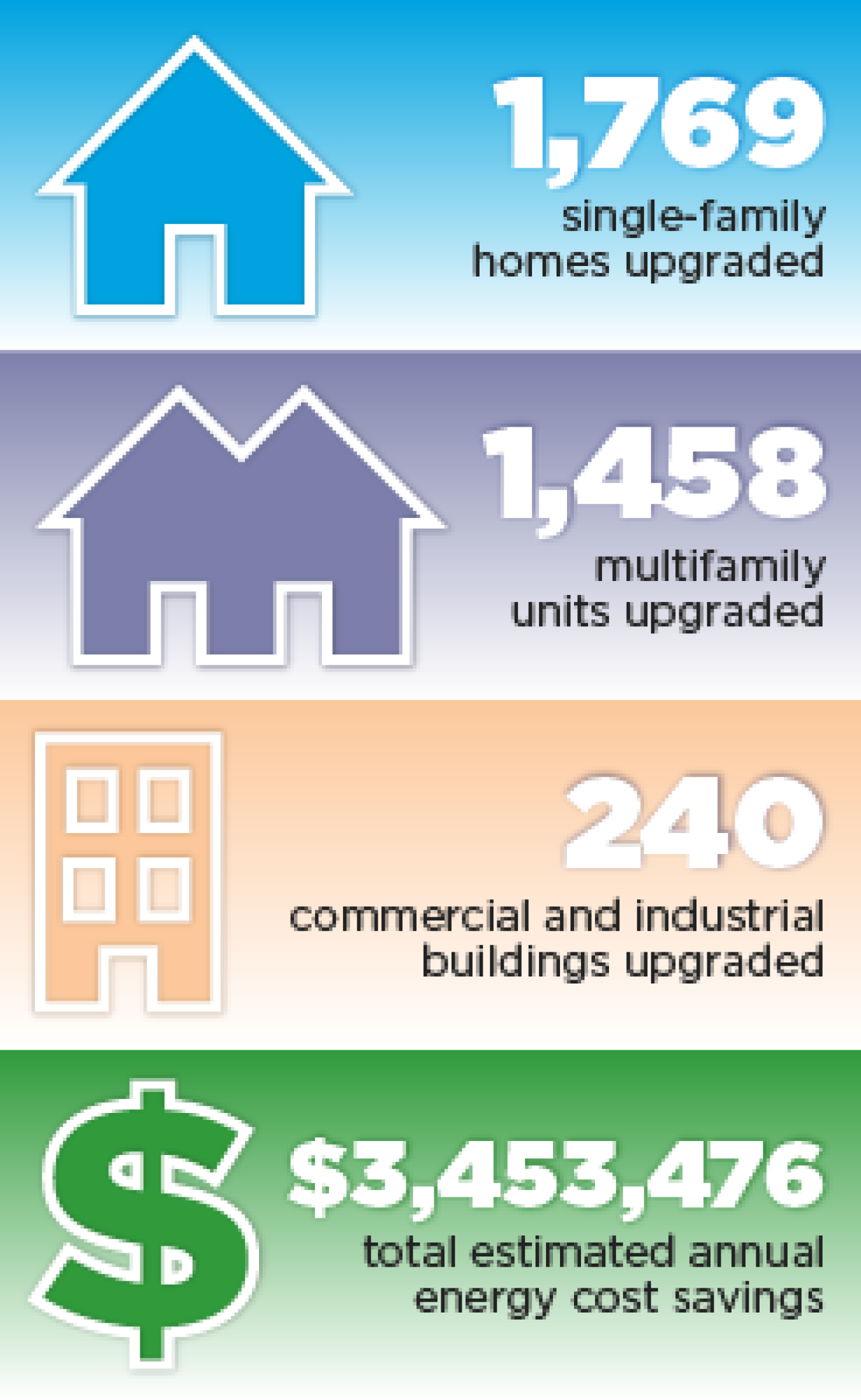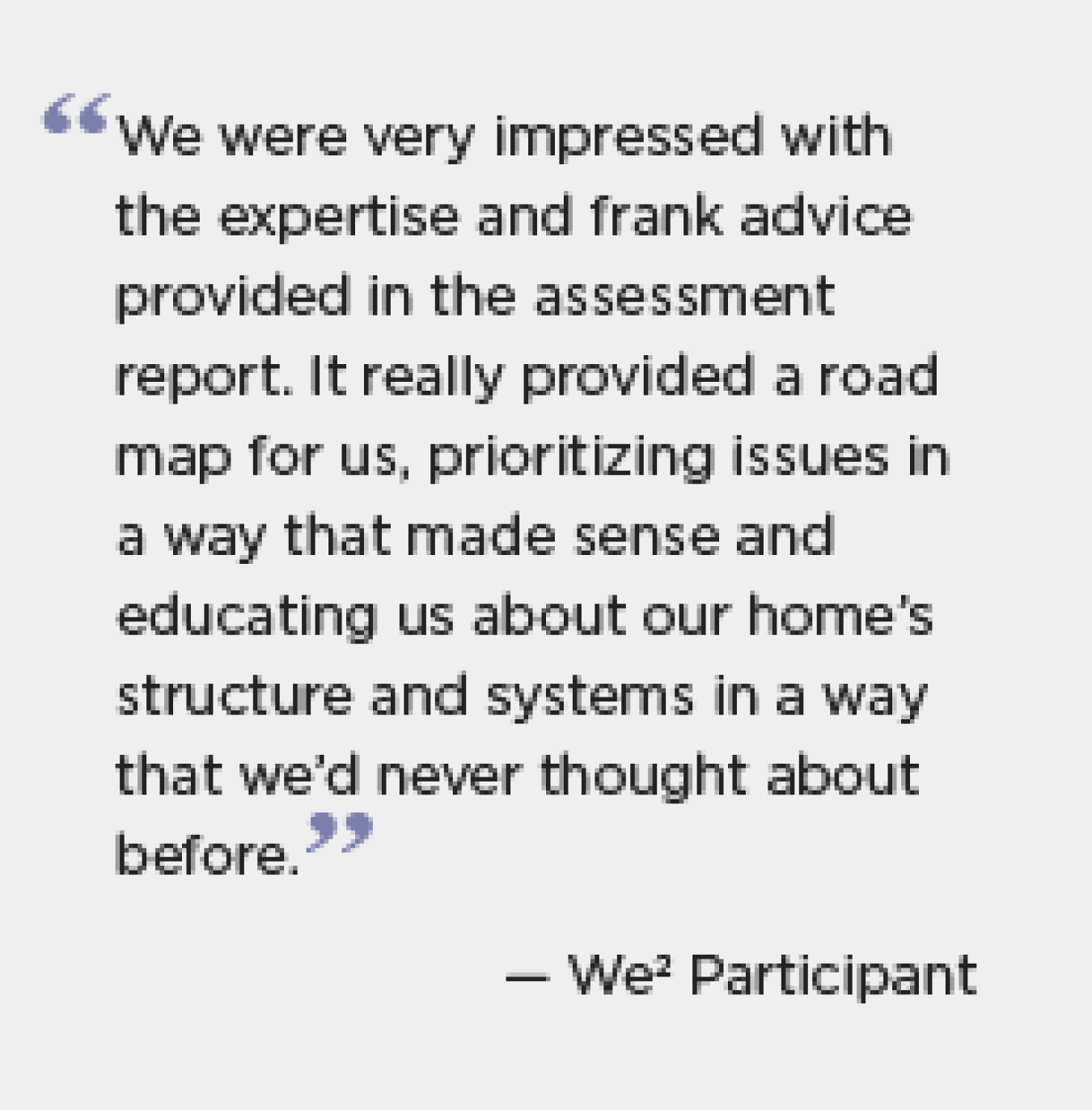
When Milwaukee, Madison, and Racine, Wisconsin, decided to work together, the result was three programs that benefited from shared ideas and individual community support. With $20 million in seed funding from the U.S. Department of Energy’s Better Buildings Neighborhood Program, the Wisconsin Energy Conservation Corporation (WECC) created Wisconsin Energy Efficiency (We2) to upgrade residential and commercial buildings and support job creation in those three cities.
Milwaukee Energy Efficiency (Me2) and the Green Madison programs educated residents and business owners about energy efficiency, financing options, and rebates available for upgrades; Racine Energy Efficiency (Re2) focused just on businesses. The three cities collaborated with the state utilities’ energy efficiency program, Focus on Energy, and partnered with local financial partners to provide energy efficiency services.
Defining Characteristics
Approaches Taken
Key Takeaways
What’s Next?
Additional Resources
Defining Characteristics
Milwaukee and Madison employed expert energy advocates to guide homeowners through the upgrade process from the initial assessment through the completion of energy upgrades. They attended real estate events, home shows, and neighborhood events to promote energy efficiency. The advocates reached out to homeowners who signed up within 48 hours to ensure they didn’t lose momentum, holding an initial meeting and providing materials and instructions on the next steps to move their project forward.
WECC provided training and mentoring to participating contractors for Building Performance Institute (BPI) Residential Building Envelope Whole House Air Leakage Control Installer, BPI Building Analyst, and Home Energy Rating System certifications. Program staff helped contractors to correct any problems identified during assessments of the completed upgrades. WECC held quarterly contractor feedback meetings in Milwaukee and Madison to improve the programs and better meet the contractors’ needs, and We2 offered sales training for contractors. For the commercial program, Focus on Energy had its energy advisors accompany contractors on sales calls to help them determine if projects were eligible for incentives. Read more in the We2 final report.
Accomplishments
(July 2010 to June 2014)


Approaches Taken
In the three cities, We2 promoted energy upgrades to home and business owners; offered financing and incentives to alleviate cost barriers; and provided contractor training to improve work quality.
- Residential Program Design: Once homeowners began the energy upgrade process, We2 assigned an energy advocate to perform a walk-through of the house, explain the program’s offerings, and provide a list of participating consultants. The selected consultant would complete a full home energy assessment, recommend energy efficiency improvements, and send the report to the energy advocate, who would explain the energy report and available financing options to the homeowners.
- Marketing and Outreach: We2 began with a soft launch of the Me2 and Green Madison programs to ensure all processes, resources, and tools were working as planned before delving into a larger effort. Marketing tactics included billboards, direct mail, social media, door hangers, and posters. Grassroots outreach at community events helped spread word-of-mouth advertising through neighbors and community members. Limited time sales and contractor bonuses were implemented during typically slower times of the year (e.g., summer, end of winter) to increase demand. Promotions often featured separate incentives for the homeowner and for the contractor to spur interest on both ends.
- Financing: In Milwaukee and Madison, homeowners received $200 off the cost of the energy assessment. If Milwaukee homeowners completed upgrades, the full assessment cost was waived. To promote deeper upgrades, We2 offered a mix of tiered financial incentives based on energy savings achieved. For example, homes could receive $750 if an energy upgrade achieved an estimated 5% to 9% energy savings, or $1,000 if it was projected to achieve 10% to 14% savings. In coordination with local lending partners, WECC created a loan loss reserve to provide low-interest loans to homeowners. WECC provided education and training to contractors on the loan product so they could estimate monthly payments for homeowners and help them complete the application, which simplified the process and aided contractors in closing the upgrade sale.
- Workforce Development: We2 worked with local contractors to help them meet program requirements and provide the documentation necessary to be listed as a participating contractor. Milwaukee and Madison used a Community Workforce Agreement to promote paying fair wages, hiring unemployed and underemployed workers, and committing to safety and environmental hazard training. Milwaukee required that contracting companies used underemployed or unemployed local workers to complete a minimum of 40% of the total hours on each project. WECC held quarterly meetings for Me2 and Green Madison contractors to provide program updates, answer questions, and connect them with training opportunities.
- Commercial Program Design: We2’s commercial program focused on small buildings such as retail and larger commercial real estate. For a project to be eligible, it had to use We2 participating contractors and have at least an estimated 15% energy savings. Focus on Energy provided energy advisors to coach commercial building owners through the upgrade process. For small businesses, WECC set up a loan loss reserve to offer low-interest loans. Through the Commercial Property-Assessed Clean Energy (PACE) program in Milwaukee, property owners of rented properties could finance energy efficiency projects that cost more than $200,000. WECC offered additional loan support in the form of Smart Security, a debt service reserve where the program would provide a reserve equal to 20% of the total loan as a deposit in the building owners’ bank of choice. Similar to homeowners, building owners could earn incentives based on the projected energy savings of the upgrades they were completing.
Key Takeaways
We2 found that by working closely with contractors and offering sales training, more homeowners signed up for upgrades and financing offerings. Other lessons learned include the following:
- Customize local programs and share what is working with others. Because the core elements of the three distinct programs were the same, the lessons learned in one community helped inform potential improvements in another community’s program.
- Use limited-time incentives. We2’s limited time offers increased demand during slow seasons. Promotions often included incentives to motivate homeowners and bonuses to motivate contractors, with positive results.
- Financial experience helps open doors. WECC understood that in order to create a loan loss reserve, it needed to demonstrate the value of the program to private financial institutions to encourage their participation. Several WECC staff members have extensive banking knowledge; this gave financial institutions more confidence in the product.
- Reduce the paperwork burden for commercial building owners. We2 instituted staged application forms, so all involved parties could know earlier if a project was eligible for the program. Commercial building owners could avoid filling out a lengthy form, just to find out later that their upgrade project didn’t qualify for the program. This also made it easier for program staff to focus on projects that met program criteria.
What's Next?
We2 will used what it learned about creating demand for residential and commercial upgrades, cultivating a qualified workforce, and providing financing options in the three cities to continue promoting energy efficiency in the following ways:
- Milwaukee, through the Me2 program, will continue to offer low-interest loans using the loan loss reserve model through the established credit union partner, as well as continue its Commercial PACE program for large commercial projects.
- Madison is reorganizing and will rebrand the Green Madison program, offering energy upgrade support for homeowners and small businesses.
- Racine will not continue its program, but as the programs in Milwaukee and Madison evolve, staff will build on the lessons learned from the Re2 program.
